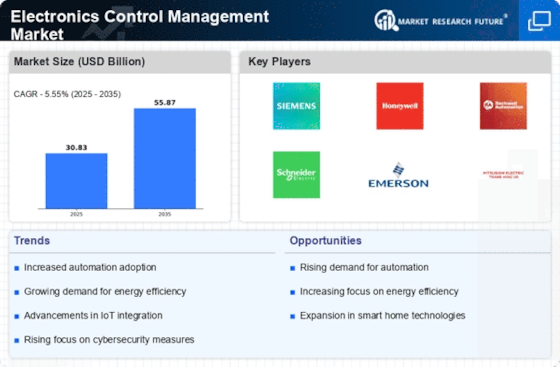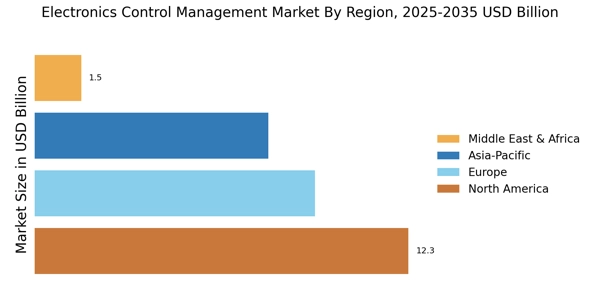Growing Industrial Automation
The trend towards industrial automation is a significant driver for the Electronics Control Management Market, as businesses seek to enhance productivity and reduce operational costs. The increasing adoption of automated systems in manufacturing and logistics is reshaping traditional processes, leading to a demand for sophisticated control management solutions. Data indicates that the industrial automation market is expanding rapidly, with projections suggesting substantial growth in the coming years. This shift is likely to propel the Electronics Control Management Market, as organizations require advanced control systems to manage automated processes effectively. Furthermore, the integration of IoT technologies within industrial automation is enhancing connectivity and data exchange, further driving the need for robust control management solutions. As a result, the Electronics Control Management Market is positioned to benefit from the ongoing transformation towards automation.
Rising Demand for Smart Devices
The Electronics Control Management Market is experiencing a notable surge in demand for smart devices, driven by the increasing consumer preference for automation and connectivity. As households and businesses adopt smart technologies, the need for effective control management systems becomes paramount. According to recent data, the market for smart home devices is projected to reach substantial figures, indicating a robust growth trajectory. This trend is likely to propel the Electronics Control Management Market, as manufacturers strive to develop innovative solutions that enhance user experience and operational efficiency. The integration of advanced control systems in smart devices not only improves functionality but also contributes to energy savings, further appealing to environmentally conscious consumers. Consequently, the Electronics Control Management Market is poised for significant expansion as it aligns with the evolving landscape of smart technology.
Increased Focus on Sustainability
Sustainability has emerged as a critical driver within the Electronics Control Management Market, as organizations increasingly prioritize eco-friendly practices. The push for sustainable solutions is evident in various sectors, including manufacturing and energy management, where companies seek to minimize their environmental footprint. Data suggests that the market for energy-efficient control systems is expanding, reflecting a growing awareness of the need for sustainable operations. This trend is likely to influence the Electronics Control Management Market, as businesses invest in technologies that optimize resource usage and reduce waste. Furthermore, regulatory frameworks are evolving to support sustainability initiatives, compelling organizations to adopt advanced control management systems that align with these regulations. As a result, the Electronics Control Management Market is expected to witness a shift towards more sustainable practices, fostering innovation and growth.
Regulatory Compliance and Standards
Regulatory compliance is increasingly influencing the Electronics Control Management Market, as organizations navigate a complex landscape of standards and regulations. The need for compliance with safety, environmental, and operational standards is driving the demand for effective control management systems. Recent data highlights that industries such as energy, manufacturing, and transportation are under heightened scrutiny, necessitating the implementation of advanced control solutions. This trend is likely to foster growth within the Electronics Control Management Market, as companies invest in technologies that ensure compliance and mitigate risks. Additionally, the evolving regulatory environment may compel organizations to adopt innovative control management practices that enhance transparency and accountability. Consequently, the Electronics Control Management Market is expected to see increased investment in compliance-driven control systems, reflecting the importance of adhering to regulatory requirements.
Technological Advancements in Control Systems
Technological advancements are significantly shaping the Electronics Control Management Market, as innovations in control systems enhance operational capabilities across various sectors. The integration of artificial intelligence and machine learning into control management solutions is revolutionizing how organizations monitor and manage their operations. Recent statistics indicate that the adoption of AI-driven control systems is on the rise, suggesting a transformative impact on efficiency and decision-making processes. These advancements enable real-time data analysis and predictive maintenance, which are crucial for optimizing performance. As industries increasingly recognize the value of these technologies, the Electronics Control Management Market is likely to experience accelerated growth. Companies that leverage cutting-edge control systems can gain a competitive edge, positioning themselves favorably in an evolving market landscape.

















